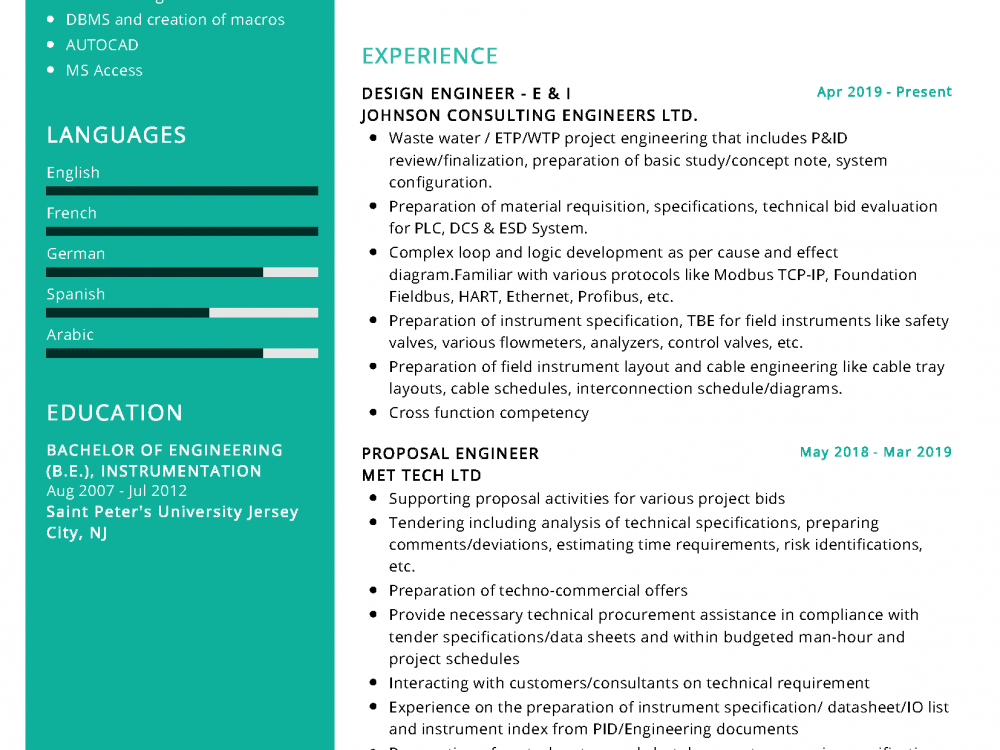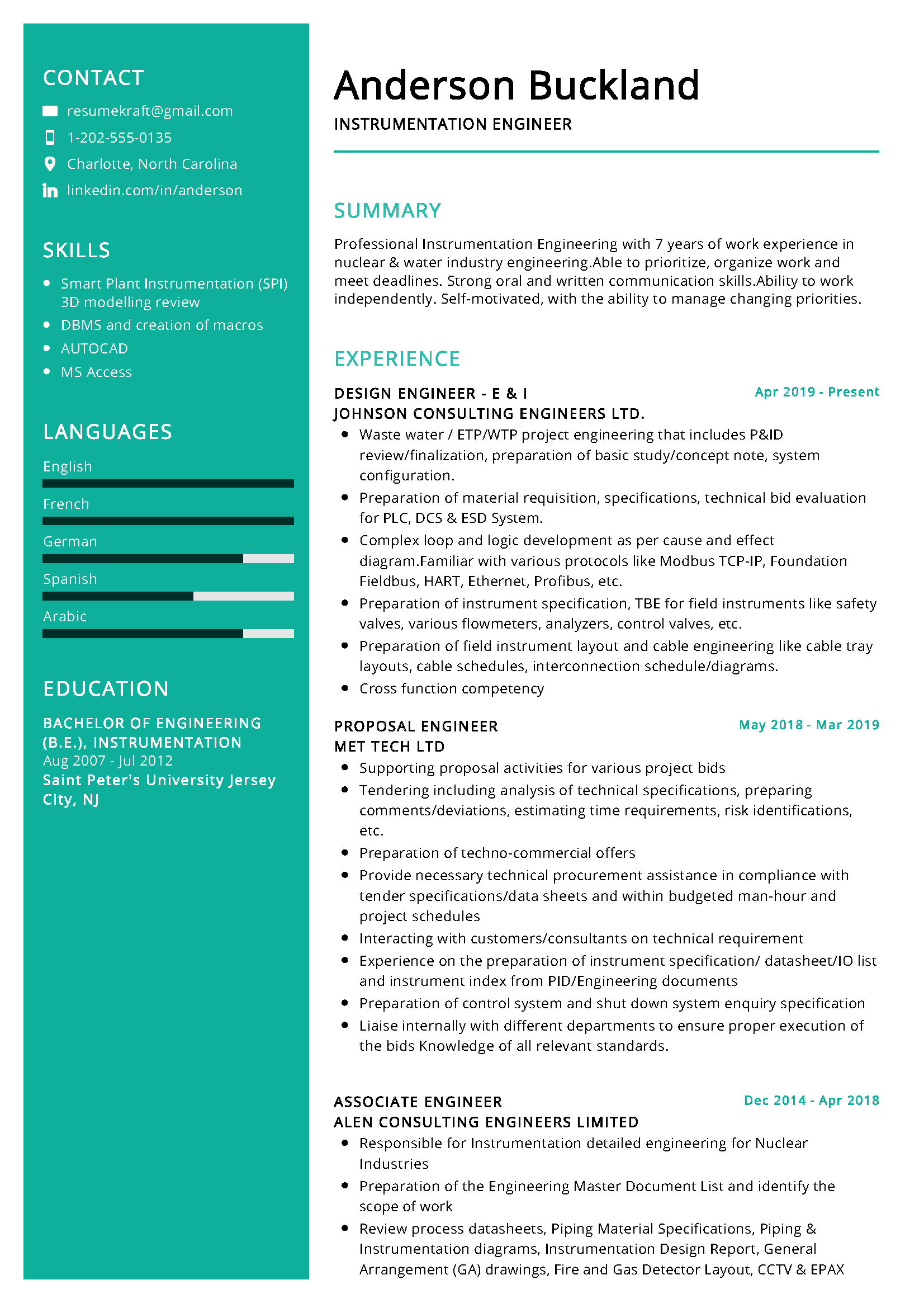Instrumentation Engineer Resume Example
Anderson Buckland
INSTRUMENTATION ENGINEER
CONTACT
resumekraft@gmail.com
1-202-555-0135
Charlotte, North Carolina
linkedin.com/in/anderson
SUMMARY
Professional Instrumentation Engineering with 7 years of work experience in
nuclear & water industry engineering.Able to prioritize, organize work and
meet deadlines. Strong oral and written communication skills.Ability to work
independently. Self-motivated, with the ability to manage changing priorities.
SKILLS
- Smart Plant Instrumentation (SPI) 3D modeling review
- DBMS and creation of macros AUTOCAD
- MS Access
EXPERIENCE
DESIGN ENGINEER – E & I Apr 2019 – Present
JOHNSON CONSULTING ENGINEERS LTD.
- Wastewater / ETP/WTP project engineering that includes P&ID review/finalization, preparation of basic study/concept note, system configuration.
- Preparation of material requisition, specifications, technical bid evaluation for PLC, DCS & ESD System.
- Complex loop and logic development as per cause and effect diagram.Familiar with various protocols like Modbus TCP-IP, Foundation Fieldbus, HART, Ethernet, Profibus, etc.
- Preparation of instrument specification, TBE for field instruments like safety valves, various flowmeters, analyzers, control valves, etc.
- Preparation of field instrument layout and cable engineering like cable tray layouts, cable schedules, interconnection schedule/diagrams.
- Cross function competency
PROPOSAL ENGINEER – May 2018 – Mar 2019
MET TECH LTD
- Supporting proposal activities for various project bids
- Tendering including analysis of technical specifications, preparing comments/deviations, estimating time requirements, risk identifications, etc.
- Preparation of techno-commercial offers
- Provide necessary technical procurement assistance in compliance with tender specifications/data sheets and within budgeted man-hour and project schedules
- Interacting with customers/consultants on technical requirement Experience on the preparation of instrument specification/ datasheet/IO list and instrument index from PID/Engineering documents
- Preparation of control system and shut down system inquiry specification Liaise internally with different departments to ensure proper execution of the bids Knowledge of all relevant standards.
ASSOCIATE ENGINEER – Dec 2014 – Apr 2018
ALEN CONSULTING ENGINEERS LIMITED
- Responsible for Instrumentation detailed engineering for Nuclear Industries
- Preparation of the Engineering Master Document List and identify the scope of work
- Review process datasheets, Piping Material Specifications, Piping & Instrumentation diagrams, Instrumentation Design Report, General Arrangement (GA) drawings, Fire and Gas Detector Layout, CCTV & EPAX
- Drawings and other relevant documents
EDUCATION
BACHELOR OF ENGINEERING (B.E.), INSTRUMENTATION Aug 2007 – Jul 2012
Saint Peter’s University Jersey City, NJ
Instrumentation Engineer Resume with Writing Guide
Are you an instrumentation engineer looking to land a new job? Well, congratulations: you’ve come to the right place. We have the perfect guide for your resume here. The resume writing guide will walk you through creating a detailed document that showcases your skills and experience in a way that will get you noticed by hiring managers.
Think about what makes you stand out from all other applicants. What sets you apart from the other instrumentation engineers? How do you apply your education and experience to your resume? We’re not asking you to brag or exaggerate — but rather, we want you to highlight the best parts of your career with examples. For example, say that you led a project that improved business efficiency by 25% in one year. If this is a project that can be quantitatively measured, then it is worth including.
Instrumentation Engineer Resume Writing Guide:
1. Learn about the industry you want to work with
Every instrumentation engineer has a different background. Make sure that your resume highlights the trade skills and knowledge you have that are most relevant to the position you are applying for. For example, if you learned an instrumentation theory course and really enjoyed this, then include this in your resume. If not, that’s fine too – as long as it shows that you are flexible and able to adapt according to job requirements.
2. Don’t be a one trick pony
Now, we’ve said that you should highlight your skills, but don’t make it sound like you are a one-trick pony — or worse, you really are! If you have a lot of solid experience in one area (i.e., the oil and gas industry), then you can leave this off the resume. But if there is only a small amount of information about your career in an area of interest to the hiring manager, then make sure to include it.
3. Be formal but not stuffy
Resumes should be detailed, but this doesn’t mean that you have to include every single little piece of information that you have – especially if it is irrelevant to the position you are applying for. Write the resume in third person, and use bullet points to explain your abilities and achievements. This will make it much easier for a hiring manager to scan through and see what aspects of your career they’d like to learn more about.
4. Think of a 3-5 sentence summary
The benefit of using a resume is that it’s a quick, easy way to highlight the skills and experience that you have. However, it often takes 3-5 minutes to read through – so don’t go too long or use too many words.
5. Be as clear as possible
Use bullet points and short sentences when possible.
Instrumentation Engineer Job Responsibilities:
- Make measurements on complex systems
- Understand and interpret engineering principles
- Remove deficiencies within systems
- Master instrumentation theory 4.5. Act as a consultant to other engineers
- Assist in the training of new employees
- Assist in the setup of new monitoring systems
- Stay up to date with technical materials
- Organize and interpret data
- Inform management of any deficiencies
Top 15 Instrumentation Engineer Skills:
- Excellent communication skills
- Proficient in mechanical systems
- High level of technical expertise
- In-depth understanding of industrial management
- Demonstrated analytical skills
- Ability to work as part of a team
- Good attention to detail
- Ability to pick up new instruments and technologies quickly
- Skilled at troubleshooting complex systems
- Strong oral and written communication skills
- Good mathematical and computer skills (Excel, Word, etc.) 12 . Demonstrated technical skills
- Knowledge of systems engineering 14. Demonstrated analytical skills
- Proficient in mechanical systems
Instrumentation Engineer Objective:
A resume objective may or may not be included, but it is a way to express what skills and experience you would like to target in a position. It allows hiring managers to see what your career goals are and showcases your ability to state your career goals as well.
Tips:
- Write about what you can do, not what you have done
- Be very specific – your goal: to make a specific measurement of a specific process that determines the health of a specific mechanism.
- Have a clear idea of the position you want to apply for before writing your resume objective 4. Make sure that it is relevant to the job and that it is something that you can prove 5 . Be honest
6 . Explain how your skill set adds value to the company
Here’s an example:
Instrumentation Engineer Objective:
To be an Instrumentation engineer, I possess excellent communication skills, technical expertise, and the ability to work within a team. I am also able to excel with attention to detail.
“To obtain an entry-level position within the oil and gas industry.”
Instrumentation Engineer Work Experience:
This is an area of the resume where you can talk about your actual experience in the instrumentation industry. Ensure that your experience is (a) relevant to the position you are applying for, and (b) that it can be quantified.
For example, if you have been working as a technician on an oil pipeline over the course of the last 10 years, then this could be a great way to display your experience and capabilities within the industry.
Instrumentation Engineer Cover Letter:
A cover letter is a very important part of the resume since it is your only opportunity to sell yourself as a potential employee. Many hiring managers will not even consider cover letters, so it is important that your letter be relevant to the position.
The good news is that you already wrote a really solid resume – now you just need to tweak it.
Tips:
- Make sure that you read the job posting to see what skills they are looking for – and then use your cover letter to highlight these.
2 . Explain how your previous experience has already equipped you with these skills - Give specific examples of how you have used these skills in the past
- Create a positive first impression – make sure that your cover letter is not a complete duplicate of your resume (it should be similar, but it also needs to highlight relevant skills and experience)
- Make it personal!
- Keep it short – ideally, your cover letter should go through the hiring manager’s ‘skimming’ area
- Proofread!!!
- Be honest and confident – don’t be afraid to sell yourself!
- Keep it simple
Here is an example of a cover letter:
A cover letter is a very important part of the resume since it is your only opportunity to sell yourself as a potential employee. Many hiring managers will not even consider cover letters, so it is important that your letter be relevant to the position.
I would like to get an entry-level position within the oil and gas industry, where I can work on computer algorithms and data analysis concerning infrastructure management systems. I am proficient in Excel spreadsheets and Microsoft Office applications.
Dear Manager,
I am writing this to express my interest in the Instrumentation Engineer position within your company. I have been working with an oil pipeline for the last 10 years as a technician, and possess the skills that are necessary for this position.
I have excellent communication skills, technical expertise, and the ability to work within a team.
Here’s an example:
To whom it may concern, My name is Mr. John Smith, and I am a recent graduate of the University of California with a Bachelor of Science degree in Instrumentation Engineering Technology. I am excited to apply for the position as an Instrumentation Engineer that is listed on Monster job postings site.
Key Takeaways:
- Always use a resume format that is consistent with the instrumentation industry (e.g. functional or resume builder)
- Use action verbs and quantify your skills, experience, and education
- Focus on your accomplishments rather than responsibilities – “I supervised 5 employees” sounds better than “I was a supervisor”
- Create a positive first impression with your resume – employers will only spend 10 seconds on it!
- Don’t be afraid to sell yourself! A great resume is a marketing tool that allows you to express your competencies in the most professional way.


